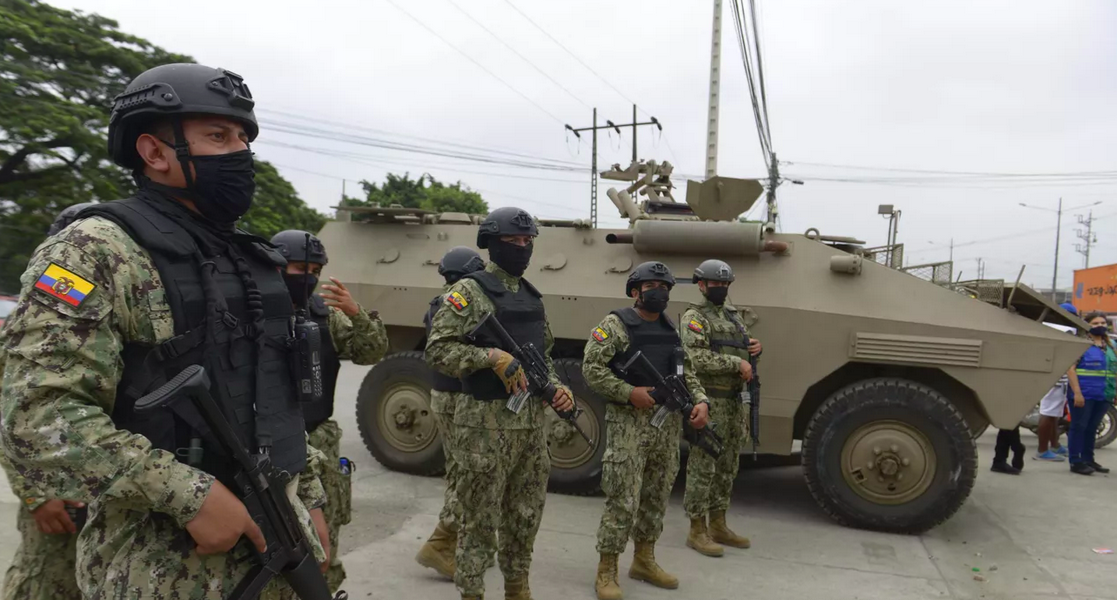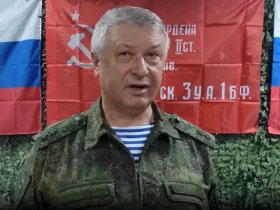By Prof. Dr. Fernando Esteche *
When we define the four main vectors by which the imperialist mode of production is reproduced, we say that they are; financialization, militarism, chaotization and narcotization (Esteche – Dagorret)[1]. To different extents and according to the contexts, some of these vectors sometimes become clearer than others. But generally, one can always find them present.
Ecuador is clearly engaged in a calculated operation of chaos and narcotization.
The invasion of a television channel and the takeover of the University of Guayaquil showed the inability of the Ecuadorian state to contain the criminal escalation that has been developing for a few years and that now triggered an untimely wave of international concern.
The State of Exception and the definition of “state of internal armed conflict” declared by President Noboa, empowering the Armed Forces to “neutralize” armed groups, amidst the suspension of constitutional guarantees, returns the country to a dangerous police state. This is what he had already announced in his election campaign. Today’s events provide a perfect excuse. All political parties, including former president Rafael Correa, accompany this step.
Probably the emergence of 13 poorly armed and less organized kids on TV, and many others at the University, facilitated and accelerated the creation of conditions that even put Ecuador at the expense of North American “aid.” The fact that these kids are poorly armed and less organized does not mean that Ecuadorian crime is reduced to these episodes.
These were not revolutionaries attacking universities and media outlets, but rather a few dozen boys enlisted in criminal gangs with no greater prospect or claims than to assert their capacity for violence. Murdering prison guards in front of the phone footage for no reason, far from linking them to the worst “political military” practices of some Mexican cartels, some Venezuelan counterrevolutionary guarimbas, or Daesh, shows them as practitioners of inappropriate and inappropriate violence without any sense.
The Bukele “package” was not only a campaign workhorse but has also been worked on during these times of government with Israeli assistance, experts in confinements and torture.
The colonization of the State and Ecuadorian politics (financed by it) by organized crime is increasingly incontrovertible evidence.
The crime of the presidential candidate who had been enunciating the state coaptation by organized crime, Fernando Villavicencio, was a corollary of a succession of crimes against political leaders such as the mayor of the port Manta, or Pedro Briones in Esmeraldas, on that same coast, a leader correista; As a demonstration of the strength of the criminal gangs against an undaunted and impotent state and political system, there was less international fear.
But to try to understand the genealogy of criminal violence in the country, we must first consider some issues that favored this situation.
Ecuador borders the two largest cocaine-producing South American states: Peru and Colombia. And it has, with the Pacific ports and road infrastructure, the best conditions in the region. It owns a dollarized economy that facilitates financial laundering operations, and a generalized deregulation in foreign trade that facilitates smuggling (customs and ports that are private even during Correismo); Furthermore, the counter-criminal intelligence apparatus was dismantled as unnecessary during Lenín Moreno’s administration, as was the Ministry of Justice, which also administered the penitentiary service.
The country’s gangs became more sophisticated and gained organization and complexity. They control a range of criminal economies.
The growth of a financial platform fueled by funds from drug trafficking and gold smuggling, rare earths, human trafficking, among many other criminal activities that found a paradise in the small country.
The accelerated dismantling of the state carried out first by Lenin Moreno and then by Lasso facilitated the infiltration and colonization of institutions and politics by criminal gangs.
In the midst of the pandemic, the terrible and tragic prison revolts occurred that revealed the state’s impotence and criminal control of the prison system. It was around then that an important boss of the largest criminal gang of that time was murdered, and where many will find the reasons for the gang explosion. We will maintain a priori that this explosion most likely has to do with the different roles that the different groups begin to play in the various stages of production, transportation and marketing in the case of drugs.
To understand this phenomenon, it is worth noting that these are generally gangs with connections in major criminal organizations abroad, such as the Sinaloa Cartel and the Jalisco Nueva Generación, which use these gangs as executors in Ecuadorian territory. The same goes for European and even Australian criminal groups.
When we talk about institutional colonization, we are assuming criminal penetration into the state apparatuses themselves, police, justice, attorney general, and executive branch. The “crossed death” for which Lasso resigns has to do with complaints that expose the unique relationship between the Albanian mafia and its most intimate environment, who are also those accused of being responsible for the political crimes indicated above.
The disinvestment in social policies resulting from neoliberal adjustment economies produced a retraction of the state of social containment that was quickly replaced by the different criminal networks. Young people between 18 and 25 years old have no other possible destiny than to enroll in criminal militancy that not only assures them an income and a social role, but also resolves police control of the territory they dominate, and assistance to widows, relatives of prisoners, and sick people who may need it. From the state side they only receive expulsion, contempt and persecution. It is a tragic equation perfectly applied.
Ecuador is today a very important cocaine distribution center for the United States and Europe. In Europe, large shipments of cocaine have been discovered hidden in shipments of bananas, bananas being the current President Noboa’s commercial item.
The disarmament and transfer of the Colombian insurgency left a power vacuum and a land to occupy on the border with the country, which the crime quickly occupied.
The consolidation of Europe as a consumer market also affects the importance of Ecuadorian ports and explains the presence of mafias such as the Albanian.
The liberalization of trade between Ecuador and the European Union, starting with the 2016 free trade agreement, not only increases the flow of commercial transport, but also makes controls more labile, facilitating criminal operations.
Some questions should be asked:
Can there be a growth in such formations of violence without a wink of laxity on the part of global surveillance devices?
Was it not obvious that, liberalizing foreign trade, a dollarized economy where there is no control of the foreign exchange or monetary market, the deregulation of controls, and the disarmament of criminal state intelligence, would establish and favor a criminal platform?
Does the anti-criminal cooperation that the United States has been offering and that now is deepening demonstrate Washington’s in what is occurring?
As a reflection we will say that President Noboa has declared a war on his territory, against crime he says, but he exposes the entire Ecuadorian population in that war without uniforms or sides, where soldiers are recruited by necessity or coercion on either side.
We enter the next few weeks when, in addition to the fascist Salvadoran criminal opprobrium, something similar will be set up in Ecuador. A continent that does not deserve such criminalization devices, and much less deserves a town where crime grows due to the lack of social inclusion policies.
[1] Brief manual of geopolitics: Declinationism, Redeployment and ultipolarism . UNLP FPyCS Edition . La Plata 2021
* Fernando Esteche is PhD in Social Communication (UNLP), full professor of International Relations (FPyCS – UNLP), professor of Contemporary Latin American History at the University of Plata, Buenos Aires and the director of PIA Global.

















Leave a Reply